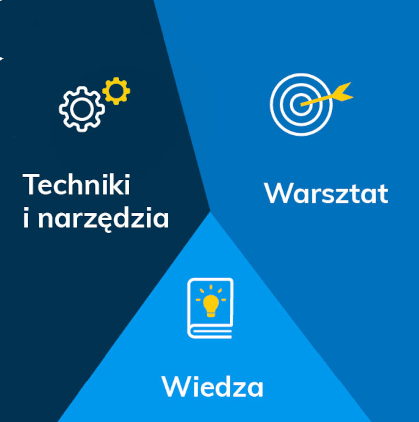Złap rabaty na szkolenia w lipcu i sierpniu. Latem mniej nawet do -290 zł netto za uczestnika Sprawdź szkolenia w promocji
Manager Academy - Team management training
Manager Academy : 180º
We will change your current beliefs about what it means to be a manager and what opportunities you have to influence employees and the management board!
33 = 17 + 10 + 6
We will provide you with 17 tools, 10 techniques and 6 models to gain 300% more employee motivation and commitment.
Your task after training is to implement. And reap the harvest.
4.96 ♥ / 5
This is the average satisfaction rating of 390 participants of 40 editions of training as part of the Manager Academy on a scale of 1-5, over the last three years.
or
Effects of the Manager Academy
During the training, you will learn:
- Motivating, inspiring and engaging the employee, especially non-financially.
- Enforcing assigned tasks and disciplining reluctant employees.
- Delegating goals and tasks.
- Fair settlement and evaluation of employees.
- Building the image of a leader, especially towards older, more experienced employees or, until recently, peers.
- Developing the employee and empowering him to develop independently.
- Building a team that cooperates and supports each other in achieving common goals for which they feel co-responsible.
- How to use the coaching management style as a transformational leader
- Management through your and company values and managing employee and team values
Our Manager Academy is full of practical tools ready for you to use!
Opinions about training within the Manager Academy
Thank you for your individual approach and appropriate exploration of team management topics. I am inspired to develop my managerial and leadership skills. Training with just the right amount of fun!
The training is worth recommending in every aspect. An interesting and productive program. Professional instructor, materials and other organizational aspects at the highest level. On a scale of 1 to 10, I rate the training as 10 :).
We conducted training for:
What is the Manager Academy?
The Manager Academy is a managerial competence development program consisting of four levels and four parts of the Manager Academy assigned to them. Our Manager Academy is unique because the development material is tailored to the level of managerial competences at which the participant is currently at. In this approach, the manager receives a range of techniques that he can put into practice at his managerial level with great benefit. During our training, we focus only on what a manager actually needs. No unnecessary theory and techniques that are useless!
The managerial levels have been developed by us based on years of experience in management - ours and that of our training participants - managers. Our starting point was Maxwell's 5 Leadership Levels, which, however, do not fulfill their role in the context of the development path of managerial competences. Below, you can see how we define the manager's development path and appropriate training within the Manager Academy to the participant's development level:

Do you want to know what managerial level you are in? Take the leadership levels test with a recommendation of the appropriate level of training - only 4 questions, it will take you 10 minutes!
4GROW Leadership Levels Test with the Manager Academy level recommendation
Select the Manager Academy level
If you are not sure which level of training to choose, take the leadership levels test with the recommendation of the appropriate level of the Manager Academy - only 4 questions, it will take you 10 minutes!
4GROW Leadership Levels Test with the Manager Academy level recommendation
Training program: Manager Academy poz. II - A business-effective manager
1. How to keep employees motivated? Principles and practical techniques
- motivation 3.0
Almost every employee who takes up a new role is happy and motivated - this motivation can be easily spoiled by inappropriate motivation, and unfortunately this is what happens most often! . Also, an employee who has been working poorly for some time will lose motivation. Therefore, at this level we focus on eradicating "weeds" and not destroying the motivation that every employee naturally has and which can be reborn on its own if it has the right conditions - a good manager:
- You will learn what mistakes in motivating and manager's behavior demotivate an employee
- And at the same time, you will learn the opposite behaviors and ways that will bring the motivation of your employees back to the optimal level of a given person
- You will learn the STAR technique in the context of motivating employee appreciation as strengthening "instant feedback"
2. From feedback to enforcing and disciplining a reluctant employee
You will learn to provide your employees with constructive feedback, based both on the so-called pure feedback, as well as elements of the so-called feedforward. You will learn to escalate your techniques to the strongest ones when your previous requests, tips, questions and feedback have failed!
- Feedback - how to talk to an employee to gently draw his attention to "development" areas? I will teach you some powerful techniques that, when properly understood and used, will bring the desired results.
- Feedback with feedforward elements - when you want to provide appreciative feedback or when you want to accelerate positive changes and feedback alone is not enough: the ZFPUP technique.
- Does your employee not follow orders? Refuses? Or he says he will do something and doesn't do it? In your real professional situations, I will show you the most effective enforcement and discipline techniques in difficult situations. Everyone will practice these techniques from the perspective of the boss and the "disciplined" and experience their effectiveness: 4AS™ - an advanced original technique that you will take care of implementation and the relationship.
- Recovery program for subordinates - a practical tool and tips for the most difficult managerial situations.
3. Delegation, settlement and performance assessment and dismissal
- Mistakes in delegation
You will see what mistakes 90% of managers make in the process of setting goals using goal setting sheets (e.g. MPD, MPO, IPD, etc.), as a result of which this process is a parody and periodic evaluations are unfair. - How to delegate , i.e. what language and phrases to use to delegate, depending on the effect you want to achieve, the employee's competences and your relationship - elements of neurolinguistics in delegation.
- SMART is not everything. You will learn our original SMART-UP model and discover how to set goals (and tasks) for employees:
- at the operational and managerial level
- learners and specialists/experts
- creative and formulaic
- committed and lazy
- How to settle and evaluate
- STAR+ZPZU - extremely effective techniques for fair evaluation - both as part of "instant feedback" and conducting periodic evaluation conversations
- What criteria should be adopted for settlement and evaluation to make it fair?
- How to determine objective and measurable success indicators?
- How to motivate to improve with a fair assessment?
- How to fire an employee by being honest and at the same time giving him encouragement and self-confidence for the future
4. How to build trust and a real team?
5 Team Dysfunctions - level I - you will receive 4 tools thanks to which employees will be more willing to help and cooperate with each other
5. Situational team management - which management style to choose?
- Sherman's 6 Levels - how to adjust delegation to the employee's situation and competences to protect against mistakes and strengthen the employee's responsibility and proactivity
- Situational management according to Hersey-Blanchard - how to recognize an employee's maturity to optimally match the management style, tools and techniques:
- R1 - enthusiastic newcomer
- R2 - disappointed adept
- R3 - competent-careful practitioner
- R4 - independent expert
- How to match your management style to the situation and employee:
- styles by Blake-Mouton
- styles by Hersey-Blanchard
Throughout the training, the trainer will pay attention to your language and body language in the context of building your authority as a leader - neurolinguistics is powerful knowledge that will help you consciously use words!
Guide your employees to the heights of efficiency...

The trainer will ask about your needs and propose an optimal program FREE
You can talk to a coach today about your problems and needs and make sure they are met. And they will be fulfilled, even if they go beyond the Manager Academy formula, because only with us the "program" means something more than the training itself:

The trainer will take care of you during EXTRA individual training FREE
When you want to tackle a challenge that goes beyond the Manager Academy program, but is related to its topic, or prepare for an important and difficult situation, practice and make sure that you optimally apply the learned techniques - you have 90 minutes one-on-one with a trainer, during the year from training. Apart from that:

The trainer supports you by phone with unlimited hours FREE
After all, after the training, we start to see more, so new questions arise. And a helping hand is useful to combine the wealth of knowledge and techniques acquired from our Manager Academy with your life. Additionally:

Access to the training platform FREE
After the training, each participant receives unlimited access to the 4GROW online platform, where they can preview training materials, use exercises and tools, read the list of recommended books and use the forum.

Group training after training FREE
Every few months, we organize 2-hour group trainings, during which you have the opportunity to further practice in front of the audience and receive feedback from the trainer and participants - thanks to this, you can further develop your skills and refresh your techniques!
See for yourself how pleasant and effective development can be!

Małgorzata Jabłońska
Psychologist and business practitioner, soft skills trainer, bilingual coach and mentor certified in the USA
Certified clinical psychologist. She completed master's studies at the Faculty of Psychology of the University of Warsaw, as well as 4-year doctoral studies at the Institute of Philosophy and Sociology of the Polish Academy of Sciences as part of the Soros Foundation.
A business practitioner with 30 years of experience working in the corporate world in top managerial positions - in Poland, the region of Europe, Africa and the Middle East and in the USA. She has gained extensive experience in effective management of human teams - in multicultural environments, working on international and global projects at various stages of building corporate structures, in the departments of market research, business analyzes and the development of global innovations.
Trainer of trainers in the field of leadership and managerial skills training, team management and presentation (certificates obtained in the USA). He specializes in management and leadership, managing change in an organization, effective communication and conflict resolution, forum speeches and business presentations, as well as managerial coaching and mentoring.
Creator of original training and workshop programs, an experienced trainer and business presentation practitioner with extensive experience in introducing international training standards to the business world in Poland.
An expert in the field of innovative teaching methods - co-author of innovative solutions for teaching SGH students, also cooperating with PWSBiA in Warsaw and Collegium Verum, Postgraduate Studies.
Manager Academy methodology
W naszych szkoleniach dostajesz właśnie w takich proporcjach:


Techniki i narzędzia konkretne strategie działania adekwatne do sytuacji i optymalne narzędzia (np. formularze, scenariusze rozmów, matryce, ściągi) – gotowce, które wiesz jak wykorzystać na co dzień
Warsztat dzięki ćwiczeniom grupowym, grom, pracy w parach, na gorącym krześle, prowokacjom, wdrażasz nowe techniki i narzędzia, doświadczasz omawianych mechanizmów na sobie także w zaskakujących eksperymentach
Wiedza niezbędne informacje, teorie przełamujące schematy i mity, badania i odkrycia z różnych dziedzin: psychologii, neurobiologii, coachingu, NLP
- The training is conducted in workshops - participants practice the techniques and tools they learn in a very diverse way.
- Everyone receives training materials, exercises and tools (forms, cheat sheets, planners, etc.).
- After the training, the participant receives access to the 4GROW training platform, where:
- all training materials are embedded and
- is a forum for written communication with the trainer and training participants on this topic, enabling asking questions and exchanging experiences.
- Online participants connect via a video-training platform with the trainer (and participants in the room, if they have registered as part of the Mix form).
Calculate the price
Or maybe you prefer the classic, stationary form of training?
and a maximum of 10 people in the room
See for yourself our quality -
Why do participants appreciate our Manager Academy?
Dates of managerial training as part of the Manager Academy
| TERMINY | WARIANT SZKOLENIA | LOKALIZACJA | |||
|---|---|---|---|---|---|
| 2025-07-07 - 2025-07-08 |
|
Warszawa
|
Zarezerwuj | ||
| 2025-10-06 - 2025-10-07 |
|
Warszawa
|
Zarezerwuj |
Team management, leadership and motivation - a must-have for a 21st century leader
Effective team management style is the holy grail for most leaders. Managers often throw up their hands, complaining that they have tried "literally everything" - no rewards or penalties have made employees engage in their tasks. These leaders have lost the desire to develop their team management skills. Others feel resistance to "negotiating" with an employee who "only has to do his job." There are also those who would certainly like to help the employees, but their "hands are tied" because the structure of the organization "does not allow them to take any action in this direction." During the training, will these leaders receive a universal recipe for effective team management, leadership and motivation?
First of all, they will refute many false beliefs and unconstructive patterns of team management. For example, by using a system of rewards and penalties to encourage an employee to perform a given task, we gain a person who takes action only due to external circumstances, i.e. as long as the carrot is appetizing enough or the fear of the whip is great enough . This style of team management, leadership and motivation causes the employee to be neither effective nor committed. It focuses only on the consequences of the task, not on its execution itself, and additionally requires constant control.Often a huge surprise during team management training, brings up the financial aspect - it is important, but overestimated by managers. Of course, each employee must be provided with some material security, but money is not the most effective motivator because it works on the principle of an external carrot.
How then can we make the employee feel satisfied with the tasks he performs, feel that it is important, and simply "want to want to"? I suggest you focus on three important areas team management, leadership and motivation and observe the effect among your employees:
- Show sense!
Employees must know what is expected of them. Too many misunderstandings result from a lack of information, so always make sure that the goal of the work is clear and known to the employee (and preferably, that the employee is its co-creator). Once he knows what to do, show him WHY he is doing it, that is, make him see the meaning and purpose of his efforts. Easy? A sense of purpose and responsibility is the basis of team management, leadership and motivation.
- Make room!
Employees usually start work with zeal and enthusiasm for action, often as a result of an incorrect style of team management, leadership and motivation remains it is unused and expires quickly. Many organizations lack space for employees' own initiative, sense of influence and co-decision making. Change it - make the team co-authors of their work, not just contractors.
- Support!
Praise from the boss is a pleasant and strong motivator, unfortunately too often there is not enough time and attention to appreciate the employees' efforts, which discourages them from further efforts. Unconstructive criticism can have a similar effect. Making mistakes is a risk inherent in every activity and, of course, requires discussion with the employee, but in a developmental way. Practice one of the most important tools for effective team management - constructive feedback, i.e. evaluate the behavior, not the person, refer to specific behaviors, talk about your own feelings, not shift the responsibility onto others…
The effectiveness of the team, the satisfaction and motivation of its individual members depend on you. It is worth working on your style of team management, leadership and motivation to contribute to the success of the team and organization.
Start achieving quick results!
Sign up for Team Management Training!










